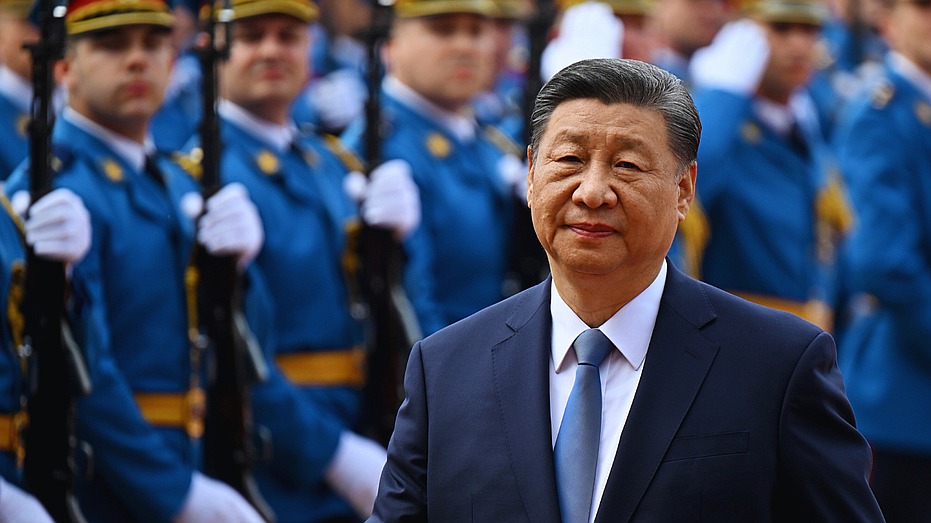Beijing is quietly dictating the trade war’s next moves as Trump and Xi prepare to meet
The ongoing U.S.-China trade war is evolving, shifting from a straightforward tariff conflict into a more complex contest of leverage, with China taking a strategic lead. As President Donald Trump prepares for a pivotal meeting with Chinese President Xi Jinping at the Asia-Pacific Economic Cooperation Summit in Busan, South Korea, the dynamics of the trade relationship appear to be subtly tipping in Beijing’s favor. While Trump has positioned his economic policies around the restoration of American dominance in global trade, experts suggest that China is adeptly adjusting its strategies—fine-tuning export controls, focusing on critical minerals, and reshaping supply chains to enhance its bargaining power. This shift leaves Washington reacting to China’s initiatives rather than dictating the terms of the trade discourse.
Experts like Bryan Burack from the Heritage Foundation emphasize that China possesses a broader array of coercive tools, allowing it to make more strategic moves than the U.S. can counter. Burack argues that China has long been working to decouple its economy from U.S. dependencies, reinforcing its self-reliance in critical technologies. In contrast, Clark Packard from the Cato Institute cautions against overestimating China’s economic strength, pointing out significant imbalances in its economy that rely heavily on manufacturing and exports. This perspective suggests a more nuanced view of the trade war, where U.S. policymakers might be misjudging China’s resilience and economic vulnerabilities.
As Trump and Xi aim to stabilize their relationship during their upcoming meeting, experts like Henrietta Levin from the Center for Strategic and International Studies believe that both leaders are seeking to ease tensions, albeit with China feeling confident in its position. Levin posits that the U.S. must regain control over the diplomatic narrative and focus on building stronger partnerships, particularly in Asia, to confront China’s aggressive trade practices effectively. By doing so, the U.S. could potentially set the terms of engagement rather than merely responding to China’s moves. The outcome of this meeting could significantly influence the trajectory of U.S.-China relations and the broader geopolitical landscape, as both nations navigate the complexities of their intertwined economies.
Related articles:
– Link 1
– Link 2
The U.S.-China trade war is shifting from a tariff fight to a contest of leverage – and Beijing is quietly setting the tempo.
As President
Donald Trump
raises the volume, Beijing is adjusting the dials, fine-tuning export controls, critical minerals and supply chains.
The move leaves Washington reacting to Beijing’s playbook instead of writing the next move, a dynamic that will hang over Trump’s next encounter with Chinese President
Xi Jinping
.
On Thursday, the two leaders of the world’s
largest economies
are set to meet on the sidelines of the Asia-Pacific Economic Cooperation Summit in Busan, South Korea. It will be their first face-to-face meeting since Trump’s return to office.
CHINA BLASTS NEW US TRADE CURBS, AS TREASURY SECRETARY NOTES TALKS BACK ON TRACK
For Trump, the
visit
is more than diplomatic choreography, it’s a stage for his economic doctrine. He’s anchored his Washington comeback on the idea of U.S. economic firepower, framing his battle cry around restoring American dominance in global trade and emerging technologies. In doing so, his administration has pressed allies and rivals alike to revisit trade terms, wielding tariffs as both weapon and warning.
“There are a lot of arrows in the Chinese quiver,” Bryan Burack, a senior policy advisor for China and the Indo-Pacific at the Heritage Foundation, told Fox News Digital. “The fact of the matter is that they can literally make more moves than we can. They have more coercive tools to use against us, and they can deploy them easier,” Burack added, pointing to U.S. industrial dependencies.
“China has been decoupling from us for a long time,” Burack said. “So a lot of these moves that look like retaliation are really part of Xi Jinping’s long-standing effort to sever dependence on the United States and build self-reliance on critical technologies. Unfortunately, the only way for us to respond is to do the same and that process is painful and excruciating,” he added.
Clark Packard, a research fellow at the Herbert A. Stiefel Center for Trade Policy Studies at the Cato Institute, said the perception that China now holds the upper hand is misplaced.
TRUMP’S FOCUS TURNS TO JAPAN AND SOUTH KOREA AS ASIA TRIP CONTINUES
“It is the most important bilateral relationship. It’s the most important geopolitical relationship,” Packard said. “But policymakers in the United States are overestimating China’s economic strength. Beijing believes global power is tilting its way, but that kind of defeatism in Washington is overdone. China’s economy isn’t nearly as strong as many people think.”
He pointed to deep imbalances within
China’s
economy as evidence. “It’s focused far too heavily on manufacturing and not enough on domestic consumption,” he said. “The country is increasingly dependent on exports and much of the world is growing uneasy with China’s outsized share of global trade,” Packard added.
Henrietta Levin, a senior fellow on China studies at the Center for Strategic and International Studies, a Washington, D.C.-based nonprofit, said Trump and Xi will likely try to cool tensions on Thursday, at least for now.
“Both sides are seeking a period of stability in the relationship,” said Levin, a former deputy China coordinator at the State Department. “They may reach a limited arrangement, but on whose terms remain to be seen. China is confident it has the upper hand in the trade war and the broader relationship, so Beijing will be reluctant to make meaningful concessions without getting much more in return.”
CLICK HERE TO GET THE FOX NEWS APP
Levin said that confidence stems from Beijing’s belief that the U.S. can’t absorb economic pain as deeply or as patiently as China can, betting that any trade war will hurt Washington faster and harder.
“What would really strengthen the U.S. hand is deepening partnerships, especially in Asia. Creating a common front against Chinese aggression and unfair trade practices, rather than trying to confront China and its allies at the same time.”
Levin added that Washington must also regain control of the diplomatic narrative. “The U.S. would be better off setting the terms of the relationship rather than merely reacting,” she said. “It feels like we may have lost the plot in our diplomacy with China and have lost sight of the structural economic issues the trade war was originally meant to address.”
Eric
Eric is a seasoned journalist covering US Politics news.



